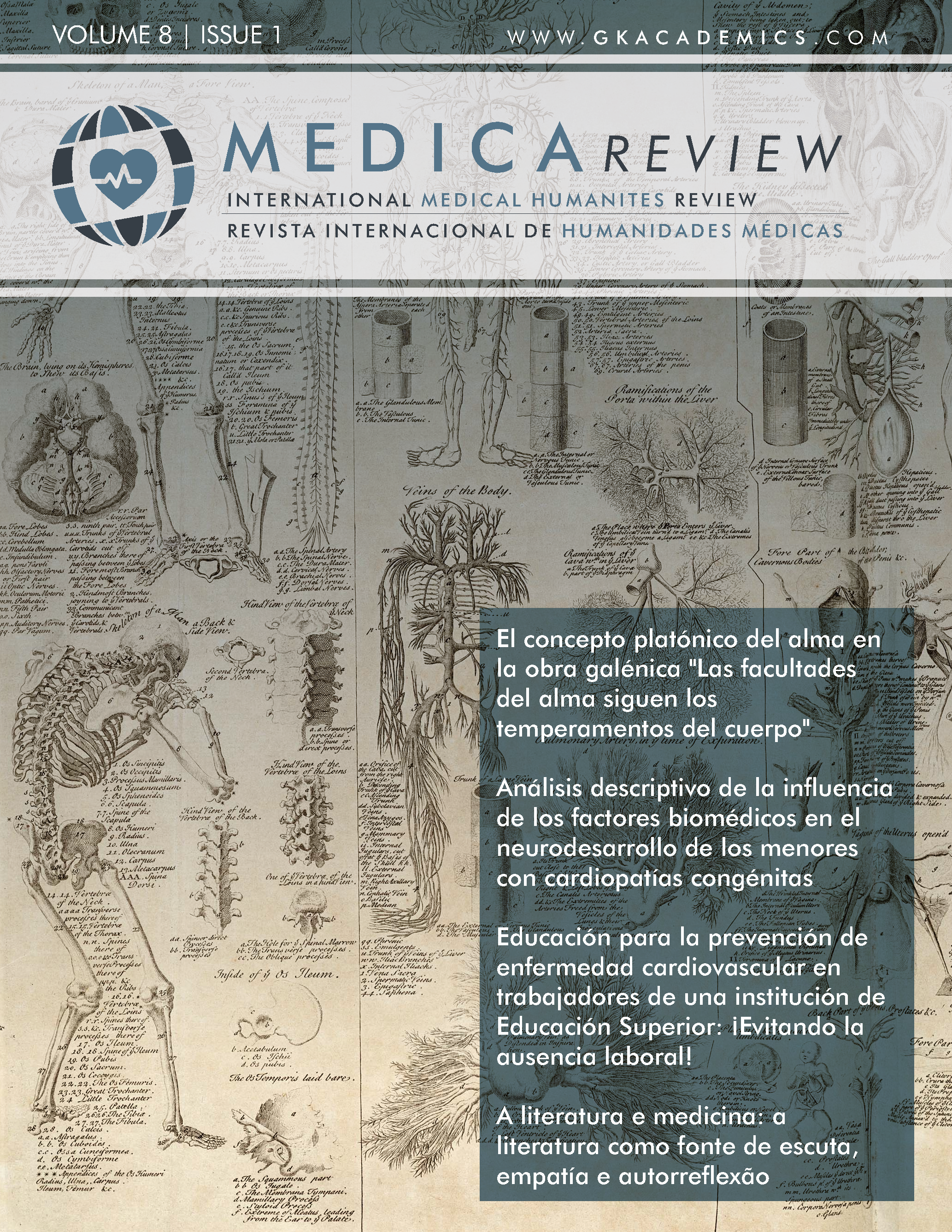Descriptive Analysis of the Influence of Somatometric Factors in the Neurodevelopment of Minors with Congenital Heart Diseases
DOI:
https://doi.org/10.37467/gka-revmedica.v8.2249Keywords:
Congenital Heart Disease, Neurodevelopment, Biomedical Criteria, Early ChildhoodAbstract
Somatometric measurements of the newborn are related to their gestational age. We want to know if the biomedical criteria are related to the slowdowns found in the neurodevelopment of minors with congenital heart defects (CC). There were 49 participants, who were assessed through the Bayley-III Child Development Scale. The results indicate that the somatometric criteria, which acquire an incidence in premature infants, seem not to be involved in the slowdowns of the population with CHD. It is necessary to expand the study sample and include incident biomedical variables in the CC to know the degree of relationship.
References
Albert, D. (2019). Niakoro. Recuperado el 1 de marzo de 2019. https://www.niakoro.com/es/
Área del Corazón Infantil HGUGM. (2017). Corazón normal. Recuperado el 6 de marzo de 2019. https://www.cardiopedhgugm.com/cardiopat%C3%ADas-congénitas/corazón-normal/
Asociación de Anomalías y Malformaciones Dentofaciales (AAMADE). 2012. Síndrome de Edwars. Recuperado el 3 de junio de 2019. http://www.aamade.com/casos-clinicos/sindrome-de-edwards.html
Bayley, N. (2015). Escala de Desarrollo Infantil Bayley-III. España: Pearson
Brotons, A. (2015). El desarrollo de la cardiología pediátrica española y su impacto en el manejo de las cardiopatías congénitas. Anales de Pediatría, 83(5): 295–296. DOI: https://doi.org/10.1016/j.anpedi.2015.07.022
Cartón, A. y Gutiérrez-Larraya, F. (2016). Cardiopatías congénitas: evolución con la edad y seguimiento en Atención Primaria. Pediatr Integral, XX (8): 539–547.
Chen C, Harrison T, Heathcock J. (2015). Infants with complex congenital heart diseases show por short-term memory in the mobile paradigm at 3 months of age. Infant Behav Dev, 40:12–19. DOI: https://doi.org/10.1016/j.infbeh.2015.02.007
Children’s Health. (2019). Comunicación interventricular (CIV). Recuperado el 6 de marzo de 2019. https://www.stanfordchildrens.org/es/topic/default?id=comunicacininterventricularciv-90-P04932
Chidren’s Health. (2019). Comunicación Interauricular (CIA). Recuperado el 6 de marzo de 2019. https://www.stanfordchildrens.org/es/topic/default?id=comunicaci243n-interauricular-cia-90-P04869
Dittrich, H., Bührer, C., Grimmer, I., Dittrich, S., Abdul-Khaliq, H. & Lange, P. (2003). Neurodevelopment at 1 year of age in infants with congenital heart disease. Heart, 89(4): 436 –441. DOI: https://doi.org/10.1136/heart.89.4.436
Esquivel-Hernández, F., Pliego-Rivero, F., Mendieta-Alcántara, G., Ricardo-Garcell, J. & Otero-Ojeda, G. (2013). Alteraciones electroencefalográficas y del neurodesarrollo en niños portadores de cardiopatías congénitas severas. Estudio preliminar. Gac Med Mex, 149 (6): 605–612.
Fundación Menudos Corazones (MMCC). (2019). Menudos Corazones. Fundación de ayuda a los niños con problemas de corazón. Recuperado el 1 de marzo de 2019. https://www.menudoscorazones.org
Fundación Salud Infantil. (2019). Cardiopatías congénitas en el recién nacido. Recuperado el 6 de marzo de 2019. https://www.fundacionsaludinfantil.org/cardiopatias-congenitas-en-el-recien-nacido/
Gerstle M, Beebe D, Drotar D, Cassedy A, Marino B (2016). Executive Functioning and School Performance among Pediatric Survivors of Complex Congenital Heart Disease. J Pediatr, 173:154–9. DOI: https://doi.org/10.1016/j.jpeds.2016.01.028
Goldsworthy, M., Franich-Ray, C., Kinney, S., Shekerdemian, L., Beca, J. & Gunn, J. (2016). Relationship between Social-Emotional and Neurodevelopment of 2-Year-Old Children with Congenital Heart Disease. Congenit Heart Dis, 11(5): 378–385. DOI: https://doi.org/10.1111/chd.12320
KidsHealth. (2019). Recuperado el 1 de marzo de 2019. https://kidshealth.org/es/parents/grownewborn-esp.html
Mayo Clinic. (2019). Síndrome DiGeorge. Recuperado el 1 de junio de 2019. https://www.mayoclinic.org/es-es/diseases-conditions/digeorge-syndrome/symptoms-causes/syc-20353543
Marino, B., Lipkin, P., Newburguer, J., Peacock, G., Gerdes, M., Gaynor, J., Mussatto, K., Uzark, K., Goldberg, C., Johnson, W., Li, J., Smith, S., Bellinger, D. & Mahle, W. (2012). Neurodevelopmental outcomes in children with congenital heart disease: evaluation and management: a scientific statement from the American Heart Association. Circulation, 126(9): 1143–72. DOI: https://doi.org/10.1161/CIR.0b013e318265ee8a
Martínez-Biarge, M. et al. (2013). Neurodevelopmental outcome in children with congenital heart disease. Seminars in Fetal & Neonatal Medicine, 5 (18): 279–285. DOI: https://doi.org/10.1016/j.siny.2013.04.006
Matsuzaki, T., Matsui, M., Ichida, F., Nakazawa, J., Hattori, A., Yoshikosi, K., Miyazaki, M., Fujii, M., Hagino, I., Kagisaki, K. & Yagihara, T. (2010). Neurodevelopment in 1-year-old Japanese infants after congenital heart surgery. Pediatrics International, 52(3): 420– 427. DOI: https://doi.org/10.1111/j.1442-200X.2009.02974.x
McGrath E, Wypij D, Rappaport L, Newburger J, Bellinger D. (2004). Prediction of IQ and achievement at age 8 years from neurodevelopmental status at age 1year in children with D-transposition of the great arteries. Pediatrics, 114(5):572–576. DOI: https://doi.org/10.1542/peds.2003-0983-L
MedlinePlus. (2019). Biblioteca Nacional de Medician de los EE.UU. Recuperado el 1 de marzo de 2019. https://medlineplus.gov/spanish/ency/article/001104.htm
MedlinePlus. (2019). Transposición de las Grandes Arterias. Recuperado el 7 de marzo de 2019. https://medlineplus.gov/spanish/ency/article/001568.htm
Miatton M, De Wolf D, François K, Thiery E, Vingerhoets G. (2007). Neuropsychological performance in school-Aged children with surgically corrected congenital heart disease. J Pediatrics:73–78. DOI: https://doi.org/10.1016/j.jpeds.2007.02.020
Mulkey, S., Swearingen, C., Melguizo, M., Reeves, R., Rowell, J., Gibson, N., Holland, G., Bhutta, A. & Kaiser, J. (2014). Academic proficiency in children following early congenital heart disease surgery. Pediatr Cardiol, 35(2): 344–352. DOI: https://doi.org/10.1007/s00246-013-0781-6
Organización Mundial de la Salud. (2019). Anomalías congénitas. Recuperado el 28 de enero de 2019. https://www.who.int/es/news-room/fact-sheets/detail/congenital-anomalies
Organización Mundial de la Salud. (2011). Clasificación Internacional del Funcionamiento, de la Discapacidad y de la Salud: versión para la Infancia y la Adolescencia (CIF-IA). Recuperado el 17 de abril de 2020. https://apps.who.int/iris/handle/10665/81610
Perez-Lescure, J., Mosquera, M., Latasa, Pello y Crespo, D. (2018). Mortalidad de las cardiopatías congénitas en España durante 10 años (2003-2012). Anales de Pediatría, 88(5): 237–298. DOI: https://doi.org/10.1016/j.anpedi.2017.06.002
Quero, M. y Sánchez, I. (2006). Capítulo II. Tipos de Cardiopatías . En Santos, J. (ED.), Manual para padres de niños con cardiopatía congénita (pp. 76–106). España: SECPCC
Rollins C, Newburger J. Neurodevelopmental outcomes in congenital heart disease. Cardiology Patient Page. 2014; 130: 124–126. DOI: https://doi.org/10.1161/CIRCULATIONAHA.114.008556
Salamanca-Zarzuela, B., Morales-Luego, F., Alcalde-Martín, C. y Centeno-Malfaz, F. (2018). Desarrollo psicomotor en pacientes con cardiopatía congénita grave. Rev. Neurología, 66: 409–414. DOI: https://doi.org/10.33588/rn.6612.2017400
Sananes R, Manhliot C, Kelly E, et al. (2012). Neurodevelopmental outcomes after open heart operations before 3 months of age. Pediatric Cardiac, 93:1577–1583. DOI: https://doi.org/10.1016/j.athoracsur.2012.02.011
Sarrechia, I., Miatton, M., François, K., Gewillig, M., Mayns, B., Vingerhoets, G. & de Wolf, D. (2015). Neurodevelopmental outcome after surgery for acyanotic congenital heart disease. Res Dev Disabil, 45-46: 58–68. DOI: https://doi.org/10.1016/j.ridd.2015.07.004
Solar, A. y García, L. (2010). Alimentación en el cardiópata. En SEGHNP-AEP. (Ed.), Protocolos diagnóstico-terapéuticos de Gastroenterología, Hepatología y Nutrición Pediátrica (pp. 348–352). Madrid: Ergon.
Schaefer C, Von Rhein M, Knirsch W, et al. (2013). Neurodevelopmental outcome, psychological adjustment and quality of life in adolescents with congenital heart disease. DMCN, 55:1143–1149. DOI: https://doi.org/10.1111/dmcn.12242
Williams, J. et al. (2015). Neurodevelopmental outcomes after cardiac surgery in infancy. Pediatrics, 135(5): 817–825. DOI: https://doi.org/10.1542/peds.2014-3825d
Downloads
Published
How to Cite
Issue
Section
License
Those authors who publish in this journal accept the following terms:
- Authors will keep the moral right of the work and they will transfer the commercial rights.
- After 1 year from publication, the work shall thereafter be open access online on our website, but will retain copyright.
- In the event that the authors wish to assign an Creative Commons (CC) license, they may request it by writing to publishing@eagora.org









